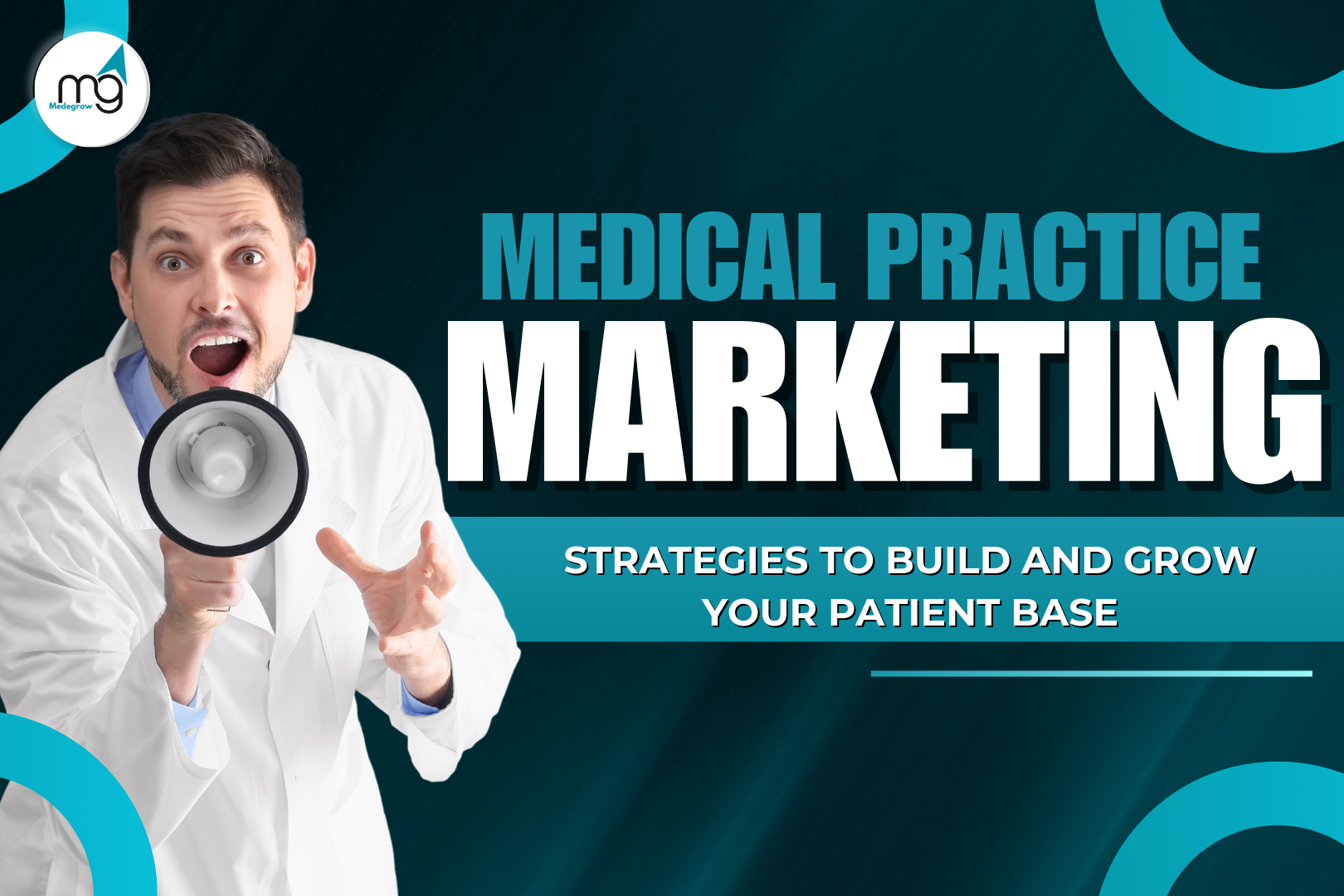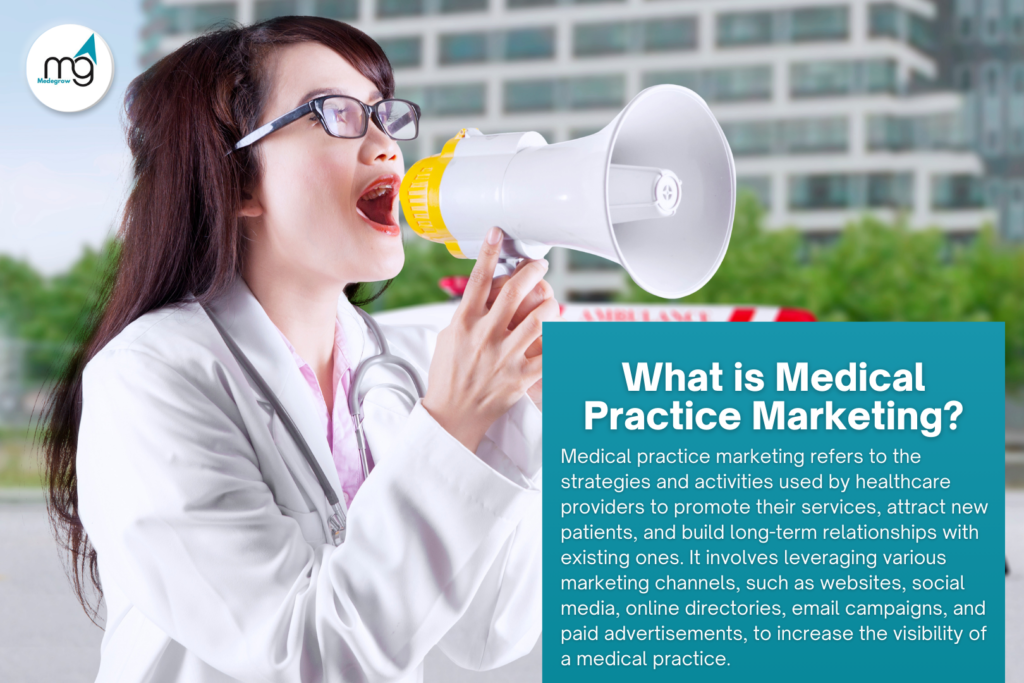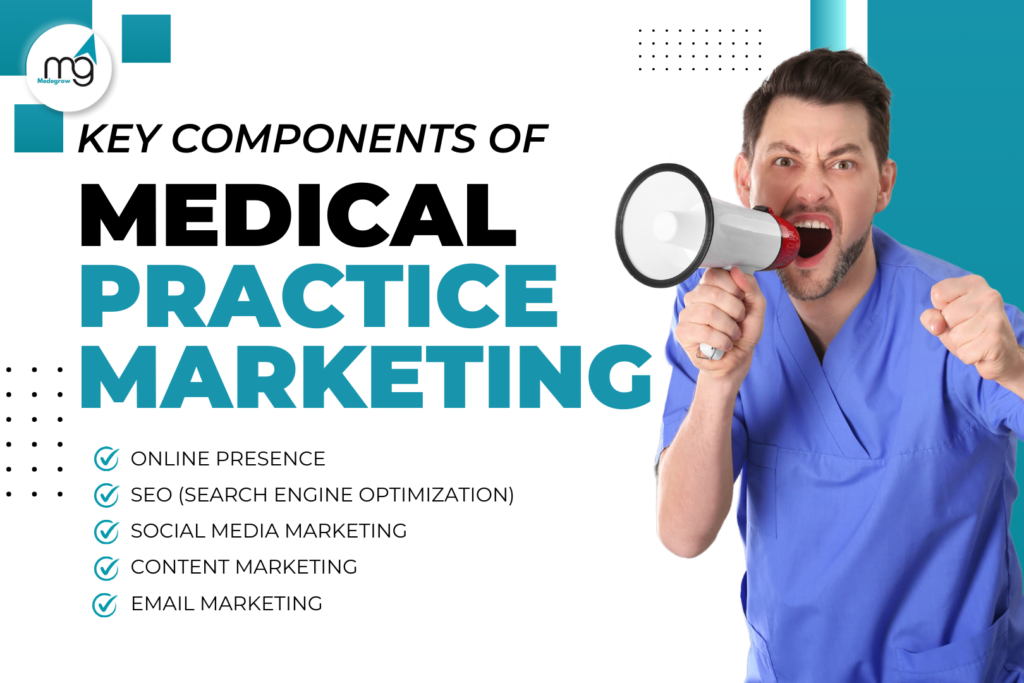
In today’s digital era, medical practice marketing is no longer a luxury but a necessity for healthcare providers seeking to thrive in a competitive landscape. Medical practice marketing encompasses strategies designed to attract new patients, retain existing ones, and build a trustworthy reputation.
However, navigating the complexities of marketing in the healthcare industry comes with its own set of challenges, including regulatory compliance and maintaining patient trust.
Marketing is not just about promoting services—it’s about creating meaningful connections with patients. Whether it’s through an engaging social media presence or a well-optimized website, an effective medical practice marketing strategy can help you stand out in the crowded healthcare market.
What is Medical Practice Marketing?

Definition and Scope
Medical practice marketing involves promoting healthcare services to attract and retain patients. This can include both traditional methods, such as print ads and community events, and digital strategies, like social media and SEO.
Marketing efforts aim to enhance the visibility of your practice while fostering patient trust and loyalty. It’s a dynamic process that evolves with patient needs and technological advancements.
Differences Between Traditional and Digital Marketing in Healthcare
Importance in Patient Retention and Acquisition
Effective medical practice marketing ensures that your practice stands out, keeps existing patients engaged, and attracts new ones.
It helps establish trust, improve patient experiences, and drive long-term growth. Patients are more likely to choose practices that demonstrate transparency, accessibility, and expertise.
Key Components of Medical Practice Marketing

Online Presence
A professional, user-friendly website is the cornerstone of medical practice marketing. It should include essential details like services offered, contact information, and patient reviews. Your website acts as the digital front door to your practice, so it must be optimized for both desktop and mobile users.
SEO
Search engine optimization ensures your medical practice ranks high in local search results, helping potential patients find you. Techniques like optimizing Google Business Profile, including relevant keywords like “medical practice marketing,” and creating location-specific content are crucial for increasing visibility.
Get a Free Consultation
Start seeing results with our expert medical practice marketing strategies Contact us today to get started!
Social Media Marketing
Platforms like Facebook, Instagram, and LinkedIn provide opportunities to engage with patients. Sharing educational content, patient success stories, and practice updates can enhance your reach. Hosting live Q&A sessions or sharing health tips can further strengthen patient relationships.
Content Marketing
Creating blogs, videos, and newsletters educates patients and positions your practice as an authority in the field. For example, a blog post about seasonal allergies or a video on post-surgical care can showcase your expertise while providing value to your audience.
Email Marketing
Personalized email campaigns nurture relationships with existing patients and keep them informed about new services, promotions, or health tips. Segmenting your email list by patient needs or demographics can make your communication even more effective.

Strategies for Effective Medical Practice Marketing
Understand Your Target Audience
Identify the demographics, preferences, and needs of your ideal patients to tailor your messaging. Understanding your audience ensures your medical practice marketing efforts resonate and drive action.
Utilize Patient Reviews and Testimonials
Positive reviews on platforms like Google or Healthgrades build credibility and attract new patients. Encourage satisfied patients to leave reviews and respond to them professionally to show you value feedback.
Use Paid Advertising
Platforms like Google Ads and Facebook Ads offer targeted advertising opportunities, ensuring your message reaches the right audience. Paid ads can be particularly effective for promoting specific services, such as annual check-ups or telemedicine consultations.
Also, check out our other blog on Online Reputation Management for Doctors – learn how managing your online reputation can help build trust and attract more patients!

Partner with Local Businesses
Collaborating with pharmacies, gyms, or wellness centers can help you reach a broader community. These partnerships can include co-hosting events, sharing promotional materials, or offering joint discounts.
Promote Telemedicine Services
Highlighting telemedicine offerings can attract patients seeking convenience and accessibility. Use marketing channels to explain how telemedicine works and its benefits, such as reduced waiting times and remote consultations.
Benefits of Medical Practice Marketing
By investing in medical practice marketing, practices can position themselves as leaders in their field while meeting patient needs more effectively.

Challenges in Medical Practice Marketing
Regulatory Compliance
Healthcare marketing must adhere to strict regulations like HIPAA, ensuring patient privacy is protected. Violations can result in hefty fines and loss of trust.
Maintaining Trust
Marketing must balance promotional efforts with a compassionate approach to avoid appearing overly commercial. Patients need to feel that their well-being, not profits, is the primary focus.
Adapting to Trends
The digital landscape evolves rapidly, requiring constant updates to strategies and tools. Staying ahead of trends, such as voice search or AI-driven personalization, can be challenging but rewarding.

Tools and Technologies for Medical Practice Marketing
Case Studies or Success Stories
Example 1: Local Clinic’s SEO Campaign
A neighborhood clinic saw a 40% increase in appointments after optimizing its website for local keywords like “medical practice marketing” and securing positive Google reviews. This case highlights the power of local SEO in driving patient acquisition.
Example 2: Social Media Success
A pediatric practice gained 5,000 followers in 6 months by sharing engaging content and hosting live Q&A sessions. Their strategy focused on creating relatable and educational posts, which resonated with parents.
Tips for Getting Started

Conclusion
Medical practice marketing is essential for growing your patient base and enhancing engagement. By embracing digital tools and strategies, practices can thrive in today’s competitive healthcare landscape.
Ready to elevate your practice? Explore professional medical practice marketing services tailored to your needs and start building a stronger connection with your patients today!
FAQs on Medical Practice Marketing
What is medical practice marketing?
Medical practice marketing refers to strategies and techniques used by healthcare providers to attract new patients, retain existing ones, and enhance their practice’s visibility. It includes online tools like SEO, social media, and email marketing, as well as traditional methods like community events and print advertising.
Why is marketing important for medical practices?
Marketing helps medical practices stand out in a competitive healthcare environment, build patient trust, improve patient retention, and attract new clients. It also ensures better communication and engagement with patients, ultimately leading to a stronger reputation and growth.
How can SEO benefit a medical practice?
Search engine optimization (SEO) improves a practice’s visibility in search results, especially for local searches like “doctors near me.” This increases the chances of potential patients finding and choosing your practice over competitors.
Is social media marketing effective for healthcare providers?
Yes, social media platforms like Facebook, Instagram, and LinkedIn are effective for engaging with patients, sharing health tips, posting practice updates, and building trust. They provide a space to humanize the practice and connect with the community.
What role do patient reviews play in medical marketing?
Patient reviews build credibility and trust. Positive testimonials attract new patients, while timely responses to reviews—both positive and negative—show your commitment to patient satisfaction.


